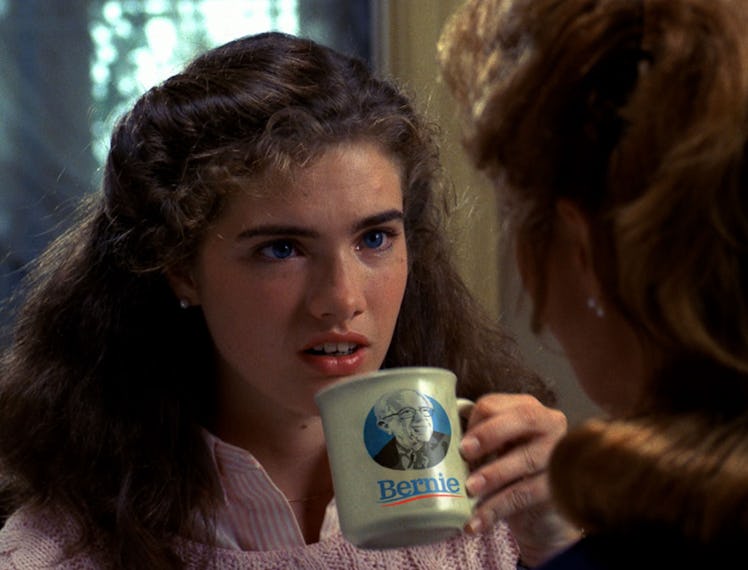Meet the Sibling Filmmakers Reimagining Donald Trump’s Presidency
Soda Jerk’s Hello Dankness combines clips from movies, news, and memes into a feature that turns the MAGA era on its head.

The smartest account of the past few bizarre, awful years in America is a movie you might not have heard of: Hello Dankness. It’s brilliant, it’s funny, and it’s made by a two-person team known as Soda Jerk—Australian-born siblings Dan and Dominique Angeloro, who are now based in New York. Masters of sampling, they’ve distilled our warped political and cultural reality—and how it’s felt to live through it—by seamlessly combining clips from movies, news, and memes into a feature-length creation. Film Forum in New York pounced on it for a theatrical run through September 28; The New York Times responded with a Critic’s Pick. Forget novelty mash-ups—Hello Dankness just might be a definitive summation of the 2016-2020 saga none of us has really processed.
“It was really about how weird that all felt in 2016,” the pair said about the rise of Trump. “When we embarked on it, we didn’t know the pandemic would happen, and we didn’t anticipate the shitshow of events that unfolded afterward.” They felt the need to set down a record of the era—a “psychic ledger.” In Hello Dankness, a first encounter with MAGA folk is hilariously portrayed with clips of Tom Hanks (from The Burbs) nervously checking out his new neighbors, an ominous house where a “Hillary for Prison” sign sits in the window (thanks to Soda Jerk’s clever digital alterations). Matching different clips, Reyn Doi from Barb and Star Go to Vista Del Mar pedals along on a bike, delivering newspapers, while Wayne and Garth wander the street, affiliation unknown.
A still from Hello Dankness.
Soda Jerk started in the music and activist worlds of Sydney, after growing up in the suburbs. Appropriation was the move: experimental hip-hop and noisecore, Napster music-sharing, artist squats, and seizing real estate were all fair game. “That’s really where our practice emerged—the politics of sampling,” they said, calling it “a form of civil disobedience.” The duo teamed up creatively to make an IP battle royale called Hollywood Burn (2002), then came to New York in 2012, where they found home in the film community. “We joined Spectacle Theater collective, which runs a microcinema in Brooklyn, and met a community of cinephiles that have kept us there ever since.”
Video installations in museums and galleries first showed Soda Jerk’s work, but the siblings fixated on feature-length filmmaking with Terror Nullius (2018)—a wild anticolonial dismantling of Australian history and culture that one funder called “un-Australian.” The experience of sustaining a work and an audience at this length was a turning point. “People will go to a cinema and watch it from beginning to end—none of this gallery bullshit where they walk in and walk out,” they said. Hello Dankness followed—incorporating and critiquing Internet influences while expanding to encompass the pandemic’s abyss—and premiered at the prestigious Berlin Film Festival, then New York’s cutting-edge new fest Prismatic Ground, before the Film Forum run.
A still from Hello Dankness.
Soda Jerk spoke with me over video from a hotel in South Korea, where they were jurors at the Seoul International Women’s Film Festival for its 25th edition. Audiences had questions about Hello Dankness, they said, but “you realize these things are so collective for so many people.” That’s precisely the genius behind Soda Jerk’s style of sampling: these aren’t disposable meme-style references, but a harnessing of the expressive power within the original movies to new purposes. In this way, Hello Dankness works on multiple levels. Hanks’s shuffling haplessness in The Burbs is the perfect look for a well-meaning voter overwhelmed by electoral forces that feel aggressive. The suburban setting bespeaks actual voter bases, according to each character’s vibe and manner: Hanks is a Bernie voter, Annette Bening from American Beauty stumps for Hillary, while Wayne and Garth... maybe you don’t want to know. Later, dazed daytime scenes from A Nightmare on Elm Street capture the unreality of soldiering on in the face of the pandemic and, well, everything else.
Creating Hello Dankness was a constant process of clip-and-idea formation, with the timeline of current events providing a spine. “We have these whiteboards in our studio, representing the different acts and chapters, and they’re constantly being reworked in terms of plotlines,” Soda Jerk said. Genre films were effective for representing “the complete rupture to the everyday.” Stoner postapocalyptic comedy This Is the End, for example, gets new life by representing the shock of Trump’s 2016 victory.
Soda Jerk
The artistic teamwork of Soda Jerk feels inspired—and inspiring. “We’re both in the studio every day. Cutting the edit, doing all of the sampling and generative stuff together.” (I manage to coax out one difference: Dan rotoscopes—the act of digitally masking footage in a sample frame-by-frame—till the cows come home, but hates doing emails.) Next up: a joyous “Big gay film.” They welcome the change of pace. “Hello Dankness has a vexed relationship to hope,” the pair said. “We don’t even know if hope is the thing we need right now. Hope doesn’t kick your ass.” Words to live by in these times—and with Hello Dankness, a visual vocabulary to make sense of it all.